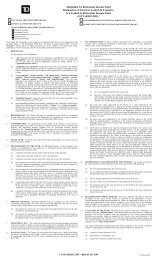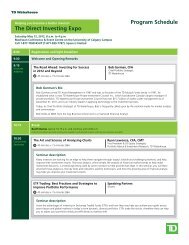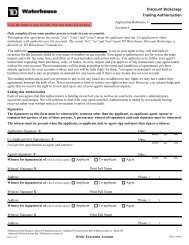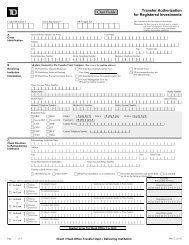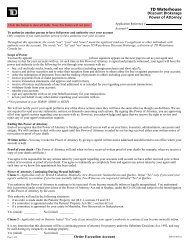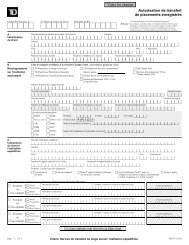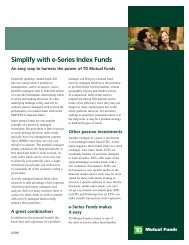Will and Estate Planning Guide - TD Waterhouse
Will and Estate Planning Guide - TD Waterhouse
Will and Estate Planning Guide - TD Waterhouse
Create successful ePaper yourself
Turn your PDF publications into a flip-book with our unique Google optimized e-Paper software.
Private Trust<br />
<strong>Will</strong> <strong>and</strong> <strong>Estate</strong><br />
<strong>Planning</strong> <strong>Guide</strong>
This <strong>Guide</strong> was created for you<br />
You have planned well <strong>and</strong> worked hard to achieve your goals. Now, you want to be sure that your<br />
affairs are h<strong>and</strong>led properly in the future. At this time in your life, estate planning should be an<br />
essential part of your comprehensive financial plan. Whatever the complexity or size of your estate<br />
(the value of your family home, investments, RSPs/RIFs, life insurance <strong>and</strong> other assets can make it<br />
larger than you might think), developing your estate plan <strong>and</strong> preparing a <strong>Will</strong> are two of the most<br />
important things you can do to protect your family <strong>and</strong> your legacy.<br />
At <strong>TD</strong> <strong>Waterhouse</strong> Private Trust 1 , we have helped make the process of preparing for the transition of<br />
your wealth simpler by developing this <strong>Will</strong> <strong>and</strong> <strong>Estate</strong> <strong>Planning</strong> <strong>Guide</strong>. The information it contains<br />
will provide you with an overview of <strong>Will</strong> <strong>and</strong> estate planning, <strong>and</strong> an underst<strong>and</strong>ing of how we can<br />
help you through all stages of the process – from planning your estate now, to distributing it<br />
according to your wishes, years from today.<br />
People <strong>and</strong> expertise you can trust<br />
<strong>Will</strong>s <strong>and</strong> estates have been an important part of our service for over one hundred years. Our experienced<br />
advisors receive comprehensive training <strong>and</strong> work with skill, empathy, <strong>and</strong> professionalism. We listen <strong>and</strong><br />
work hard to underst<strong>and</strong> your needs so that you can meet the estate objectives you have set.<br />
Our commitment<br />
We are committed to –<br />
• providing professional <strong>and</strong> compassionate treatment of your beneficiaries<br />
• protecting your assets <strong>and</strong> helping ensure your investments are managed prudently<br />
• helping ensure that your wishes are carried out<br />
• settling your estate in a timely <strong>and</strong> efficient fashion<br />
We’re here to help<br />
If you are considering naming us as Executor, our estate planning team will work with you <strong>and</strong> your legal<br />
advisor to develop a comprehensive estate plan. We will help ensure that your final plan delivers on your<br />
wishes, preserves your assets, <strong>and</strong> enhances your estate’s value for your beneficiaries.
Table of Contents<br />
Why is estate planning so important? . . . . . . . . . . . . . . . . . . . . . . . . . . . . . . . . . . . . 1<br />
What is involved in estate planning? . . . . . . . . . . . . . . . . . . . . . . . . . . . . . . . . . . . . . 2<br />
1. Know what you have . . . . . . . . . . . . . . . . . . . . . . . . . . . . . . . . . . . . . . . . . . . . . . 2<br />
2. Decide what your estate plan should achieve . . . . . . . . . . . . . . . . . . . . . . . . . . 2<br />
3. Choose how you want your estate distributed . . . . . . . . . . . . . . . . . . . . . . . . . . 3<br />
4. Determine how to accomplish your objectives . . . . . . . . . . . . . . . . . . . . . . . . . 7<br />
Benefits of The Canada Trust Company as Executor . . . . . . . . . . . . . . . . . . . . . . . 11<br />
Our Organization as Executor . . . . . . . . . . . . . . . . . . . . . . . . . . . . . . . . . . . . . . . . 11<br />
Our Organization as Co-Executor . . . . . . . . . . . . . . . . . . . . . . . . . . . . . . . . . . . . . 12<br />
Our Organization as Alternate Executor . . . . . . . . . . . . . . . . . . . . . . . . . . . . . . . . 12<br />
Our Organization as Agent for Executor . . . . . . . . . . . . . . . . . . . . . . . . . . . . . . . . 12<br />
Getting started . . . . . . . . . . . . . . . . . . . . . . . . . . . . . . . . . . . . . . . . . . . . . . . . . . . . . . . 13<br />
Glossary . . . . . . . . . . . . . . . . . . . . . . . . . . . . . . . . . . . . . . . . . . . . . . . . . . . . . . . . . . . . 14
Why is estate planning so important?<br />
The realization of the goals you have set in life – goals such as your children’s education, your family’s<br />
economic independence, continuity of a family business or your support for charities – are continued through<br />
your estate plan. Your plan, including an up-to-date <strong>Will</strong>, sets out your vision for how you want your assets<br />
distributed after your death, <strong>and</strong> ensures that your wishes for your family <strong>and</strong> estate are carried out.<br />
If you were to die without a <strong>Will</strong>, your estate could face the following consequences –<br />
• the distribution of your property would be governed by a legislated formula<br />
• the person with authority to administer your estate would not necessarily be someone you would<br />
have chosen<br />
• the cost of administering your estate could be higher, <strong>and</strong> distribution to your beneficiaries could<br />
be delayed<br />
Clearly, it is important for your peace of mind, <strong>and</strong> your family’s future, that you develop an estate plan as part<br />
of your complete financial plan.<br />
1
What is involved in estate planning?<br />
This section reviews the four steps involved in developing your estate plan – itemizing your assets <strong>and</strong><br />
liabilities, deciding what your estate goals are, choosing how you want your estate distributed, <strong>and</strong> determining<br />
how to accomplish your objectives.<br />
When you are ready to begin the planning process, we can provide you with our <strong>Will</strong> & <strong>Estate</strong> Personal<br />
Planner. It contains worksheets that will make it easier to compile the required information <strong>and</strong> outline your<br />
wishes. We would be pleased to work with you to complete the Personal Planner, or, you may prefer to<br />
complete it on your own before meeting with one of our <strong>Estate</strong> <strong>and</strong> Trust Specialists.<br />
1. Know what you have<br />
Before you can establish your estate plan, you must know what your assets <strong>and</strong> liabilities are, to get an idea of<br />
what your estate is worth. Your list of assets might include –<br />
• investments such as stocks, bonds, GICs <strong>and</strong> mutual funds<br />
• RSPs, RIFs, RESPs, annuities <strong>and</strong> pensions<br />
• real estate<br />
• personal property such as cars, jewellery, art <strong>and</strong> antiques<br />
• business interests<br />
• insurance policies<br />
It is important to know not only what you own, but how you own it, because the form of ownership <strong>and</strong><br />
designated beneficiaries will influence your estate plan. You will want to identify assets you own jointly<br />
with your spouse or another person, <strong>and</strong> who are the designated beneficiaries of your RSPs, pensions, <strong>and</strong><br />
insurance policies.<br />
2. Decide what your estate plan should achieve<br />
How you structure your estate plan depends on what you want to accomplish. For example, an older couple in<br />
retirement without dependant children will have a different set of objectives than a younger couple with<br />
children, or a single person. Each situation is unique. Many people make a list of what they want to achieve<br />
with their estate plan, <strong>and</strong> a separate list of issues <strong>and</strong> problems they want to avoid.<br />
2
What is involved in estate planning?<br />
While your goals are unique to your situation, here are some common objectives you may wish<br />
to consider –<br />
• maximizing the value of your assets<br />
• providing for loved ones<br />
• helping to secure responsible guardians for your children <strong>and</strong> dependants<br />
• ensuring appropriate Trustees for your children’s <strong>and</strong> dependant’s trusts<br />
• distributing assets according to your wishes<br />
• making sure your estate has sufficient liquid assets to pay taxes <strong>and</strong> other liabilities after your death<br />
• communicating the values that are important to you <strong>and</strong> that you wish to see continued<br />
As well, there are some common problems you will want to avoid –<br />
• financial burden for your family<br />
• loss of assets<br />
• delays in settling your estate<br />
• taxation of your estate<br />
• unnecessary costs<br />
• disharmony in the family<br />
3. Choose how you want your estate distributed<br />
One of the decisions that you must make in planning your estate is deciding what to leave <strong>and</strong> to whom.<br />
However, it is also important to decide in what manner you want your assets distributed.<br />
This section outlines the four basic distribution methods – gifting, living trust, distribution through your estate,<br />
<strong>and</strong> distribution outside your <strong>Will</strong>. Factors such as your financial situation, your tax plan, <strong>and</strong> your probate<br />
plan will have a bearing on which method you choose. In all likelihood, your estate plan will incorporate a<br />
combination of these methods to accomplish your objectives.<br />
Gifting Assets Before Death<br />
Gifting assets means passing them on to your beneficiaries while you are still alive. This method can allow<br />
you to reduce costs when your estate is being administered. However, there are other factors that should be<br />
considered such as potential capital gains tax <strong>and</strong> losing control over the assets that are gifted.<br />
3<br />
Although gifting assets can reduce the tax liability of your estate, this distribution method needs careful<br />
consideration. If you decide to gift assets, we can help ensure that this choice will effectively minimize taxes.
What is involved in estate planning?<br />
Living Trusts<br />
A trust is a legal arrangement in which you place property “in trust” for the benefit of one or more<br />
beneficiaries <strong>and</strong> name a Trustee to manage the trust.<br />
There are two types of trusts – living trusts, also called “inter-vivos” trusts, <strong>and</strong> testamentary trusts. A living<br />
trust is established during your lifetime. A testamentary trust is outlined in your <strong>Will</strong>, <strong>and</strong> takes effect only<br />
after your death. You’ll find more about testamentary trusts on page 5.<br />
There are different reasons why people choose to establish a trust. Among them are –<br />
• to provide long-term income or care for minor children, dependants, or family members with special needs<br />
• to safeguard your property <strong>and</strong> assets for your beneficiaries<br />
• to provide lasting donations to charities <strong>and</strong> other organizations<br />
• to reduce probate fees<br />
These are just a few reasons – there are others, each with its own implications. Establishing <strong>and</strong> administering<br />
a trust requires professional assistance to help ensure that it meets your needs <strong>and</strong> requirements.<br />
4
What is involved in estate planning?<br />
Distributing Assets Through Your <strong>Estate</strong><br />
Distribution of assets that fall under your estate will be outlined in your <strong>Will</strong>. There are two ways assets<br />
designated in your <strong>Will</strong> can be distributed – immediately or through testamentary trusts.<br />
Immediate Distribution –<br />
Immediate distribution means that your Executor, following your wishes, distributes all or part of your estate<br />
to your beneficiaries after all outst<strong>and</strong>ing debts are paid <strong>and</strong> any tax issues with Canada Revenue Agency are<br />
resolved. While this method of distribution allows you to maintain control over these assets in your lifetime,<br />
there may be negative tax implications for your estate.<br />
Upon death, assets in your estate are generally considered, for tax purposes, to have been sold. This means any<br />
resulting tax on capital gains may have to be paid. Unless your estate has liquid assets available to pay this tax,<br />
you could be leaving your estate <strong>and</strong> beneficiaries with a tax burden, or the estate may be required to sell an<br />
asset to meet the tax obligations.<br />
It is important to know that a <strong>Will</strong> often needs to have been “probated” in order to distribute assets through the<br />
estate. Probate is a court process that –<br />
• confirms your <strong>Will</strong> is valid<br />
• confirms the <strong>Will</strong> presented is the “Last <strong>Will</strong> <strong>and</strong> Testament”<br />
• confirms the authority of the Executor to administer the estate <strong>and</strong> distribute the assets<br />
• is not required for Quebec Notarial <strong>Will</strong>s<br />
Probate fees are payable to the court <strong>and</strong> vary by province. In some provinces, they are based on a percentage<br />
of your estate value, while in other provinces they are flat fees, or a combination of both. These fees are<br />
usually paid from the proceeds of your estate.<br />
Testamentary Trusts –<br />
Testamentary trusts are outlined in your <strong>Will</strong> <strong>and</strong> take effect upon your death. A testamentary trust provides for<br />
a named beneficiary to receive payments of income at any frequency you choose. The trust can also reserve<br />
the capital for specific purposes <strong>and</strong> direct how it is to be used. The Trustee who will administer the trust<br />
should be qualified, competent <strong>and</strong> willing to perform the many tasks required to ensure that your wishes are<br />
carried out.<br />
5
What is involved in estate planning?<br />
There are many reasons for the creation of a testamentary trust. Some examples include –<br />
• to ensure that the money <strong>and</strong>/or other assets are well-managed<br />
• to comply with the laws regarding leaving money to children under a certain age<br />
• to provide for specific purposes such as a child’s education<br />
• to ensure that funds being left to benefit a person who is not capable of managing money will last over<br />
many years<br />
• to provide for children from a previous marriage while providing for your present spouse during his or<br />
her lifetime<br />
Trusts are complex <strong>and</strong> there are a number of considerations to take into account. We recommend that you<br />
consult us for help in planning, establishing <strong>and</strong> administering trusts.<br />
Distributing Assets Outside Your <strong>Will</strong><br />
Many people include probate fees as part of their estate planning exercise. If probate fees concern you, you<br />
may be able to lower them by reducing the number of assets that fall under your estate. Examples of assets<br />
that may not be subject to probate include –<br />
• RSPs, RIFs<br />
• life insurance proceeds<br />
• pension plan proceeds<br />
• assets that are owned jointly<br />
Registered plans, life insurance <strong>and</strong> pensions may not be subject to probate fees provided there is a<br />
specific beneficiary (allowed in most provinces) named in your <strong>Will</strong>, or designated directly with the plan<br />
or policy administrator.<br />
Joint ownership of assets generally means that the asset will pass directly to the survivor, again, without<br />
passing through the estate.<br />
Although distributing assets outside your <strong>Will</strong> could help to minimize probate fees payable, there are<br />
complexities. For example, joint assets can be subject to tax laws, provincial family laws, <strong>and</strong> estate<br />
taxes <strong>and</strong> liabilities. We will be pleased to suggest ways to optimize your estate plan with respect to<br />
non-probatable assets.<br />
6
What is involved in estate planning?<br />
4. Determine how to accomplish your objectives<br />
Prepare Your <strong>Will</strong><br />
Your <strong>Will</strong> is the most important component of your estate plan. In fact, few documents are as significant.<br />
Dying without a <strong>Will</strong>, also referred to as dying “intestate,” can have unintended consequences. If this were to<br />
happen, your estate would be distributed according to the intestacy laws in your province. All provinces have<br />
specific rules as to how an estate is to be divided among the living heirs of the deceased. The end result may<br />
be quite different than what you would have wanted, particularly where there are minor children involved.<br />
The absence of a <strong>Will</strong> can also delay the distribution of your estate, resulting in inconvenience or even<br />
financial difficulty for your beneficiaries. Also, your estate may incur unnecessary administration costs.<br />
If you do not already have a <strong>Will</strong>, you should prepare one after you have considered all the aspects outlined so<br />
far. Our clients typically have their own lawyer draft their <strong>Will</strong> based on the estate plan we have helped<br />
develop. Should you wish, we can work with your lawyer. Once the <strong>Will</strong> is written, we will review it with you<br />
to confirm that all your goals have been met.<br />
In addition to providing instructions for distributing your estate, your <strong>Will</strong> is the document where you can<br />
name your choice of a guardian for your minor children. While the designation is not legally binding, naming<br />
a guardian in your <strong>Will</strong> lets the court know who you want to care for your children, <strong>and</strong> may influence the<br />
court’s permanent appointment.<br />
Once completed, your <strong>Will</strong> should be held in safekeeping. The Canada Trust Company will hold <strong>Will</strong>s for<br />
safekeeping in our vault as a complimentary service for clients who have appointed us as their Executor. Most<br />
of our clients prefer this option, as the <strong>Will</strong> is then available for review, upon request.<br />
It is important that your <strong>Will</strong> be kept up-to-date. Generally, your <strong>Will</strong> should be reviewed every three to five<br />
years, or whenever there are significant changes in your personal or financial circumstances, or those of your<br />
beneficiaries. In addition, changes in the laws of your province may affect your estate plan. You may contact<br />
our <strong>Estate</strong> <strong>and</strong> Trust Specialists whenever you wish to review your <strong>Will</strong>.<br />
7
What is involved in estate planning?<br />
Prepare a Power of Attorney<br />
Part of a complete estate plan includes planning for possible illness, accident, or other disability that leaves<br />
you unable to manage your affairs. A Power of Attorney 2 for property is a legal document that empowers<br />
another person to manage your financial affairs during your lifetime. In addition, in some provinces, it is now<br />
possible to name a Power of Attorney for personal care, which allows you to name someone to make decisions<br />
on your behalf concerning nutrition, shelter, clothing <strong>and</strong> consent for medical treatment should you become<br />
incapable of doing so.<br />
Before you prepare a Power of Attorney, a lawyer should be consulted so that you fully underst<strong>and</strong> the powers<br />
that your designated attorney will have, <strong>and</strong> the circumstances under which the Power of Attorney can be<br />
activated or terminated. If you wish, The Canada Trust Company can be named as your Power of Attorney<br />
for property.<br />
In all cases, Powers of Attorney terminate upon your death, at which time your <strong>Will</strong> takes effect.<br />
8
What is involved in estate planning?<br />
Choosing A Qualified Executor<br />
An Executor is one or more individuals or a trust company, appointed in your <strong>Will</strong> to administer <strong>and</strong> distribute<br />
your assets after your death. Your Executor might be –<br />
• your spouse<br />
• your children<br />
• a family member<br />
• a friend or business associate<br />
• your lawyer/accountant<br />
• The Canada Trust Company<br />
Many people believe they are bestowing an honour on family members or friends by naming them Executor.<br />
In fact, very few truly underst<strong>and</strong> the duties of an Executor <strong>and</strong> the difficulties that this obligation can bring<br />
to an inexperienced person. Often, the burden is imposed at a time when the level of stress for the family is<br />
already high. So after all the effort you put into<br />
planning your estate, be sure to appoint someone<br />
who is qualified to carry out your wishes. Some of<br />
the duties of an Executor are listed below –<br />
• locate, safeguard, itemize<br />
<strong>and</strong> value all assets (including<br />
foreign property)<br />
• provide for immediate management of all<br />
assets, including business interests <strong>and</strong><br />
investment portfolios<br />
9
What is involved in estate planning?<br />
• redirect mail <strong>and</strong> cancel leases, subscriptions <strong>and</strong> memberships<br />
• arrange for probate of the <strong>Will</strong><br />
• advertise for creditors<br />
• re-register the ownership of assets<br />
• raise cash to pay debts, taxes, <strong>and</strong> legacies<br />
• keep proper estate records<br />
• distribute assets to beneficiaries<br />
• prepare <strong>and</strong> file numerous tax returns<br />
• set up <strong>and</strong> administer all trusts as Trustee<br />
Being an Executor is a complex job that includes some risks. For example, Executors can be personally liable<br />
for errors made in administering the estate. In addition, Executor duties can last for months or years,<br />
particularly in cases of trusts or more complicated estates <strong>and</strong> family situations.<br />
A qualified Executor should have –<br />
• knowledge of estate administration <strong>and</strong> taxation<br />
• knowledge of estate <strong>and</strong> trust law<br />
• financial expertise<br />
• time <strong>and</strong> availability<br />
• trustworthiness<br />
• good judgment<br />
• impartiality<br />
• experience working with families<br />
• the ability to build consensus<br />
The Executor, whether family member, friend, or professional, is entitled to claim fees based on a percentage<br />
of your estate’s value, as set by the courts, or by agreement. Often, when we are named as corporate Executor,<br />
our expertise in estate administration can result in savings in taxes <strong>and</strong> other costs that more than offset any<br />
Executor fees.<br />
10
Benefits of The Canada Trust Company as Executor<br />
<strong>Estate</strong> administration is not a simple task. We encourage you to consider appointing The Canada Trust<br />
Company as your Executor, Co-Executor, Alternate Executor, or Agent for your Executor. 1 A matter as<br />
important as the distribution of your estate should be left to specialists so you can feel confident that your<br />
wishes will be carried out.<br />
Our expertise includes –<br />
• advice <strong>and</strong> administration in tax, trusts <strong>and</strong> asset management 3<br />
• experience in dealing with complex estate issues<br />
• underst<strong>and</strong>ing of your wishes <strong>and</strong> the needs of your beneficiaries<br />
• impartiality<br />
• full-time resources to help ensure the timely settlement of your estate<br />
Our Organization as Executor<br />
As your corporate Executor, we will h<strong>and</strong>le all of the duties that come with being an Executor.<br />
11
Benefits of The Canada Trust Company as Executor<br />
Our Organization as Co-Executor<br />
Even if you have someone else in mind to name as your Executor, we can still assist in your estate planning<br />
<strong>and</strong> administration if you name The Canada Trust Company as Co-Executor. As Co-Executor, we will act in<br />
conjunction with another named Executor <strong>and</strong> assume the duties of administration.<br />
You will receive the benefit of our experience as we attend to all of the administrative responsibilities, while<br />
the other Executor (perhaps a family member or friend) shares in all decision-making, <strong>and</strong> provides their<br />
personal insight, direction <strong>and</strong> advice.<br />
Our Organization as Alternate Executor<br />
When two people (usually spouses) name each other as Executor, The Canada Trust Company can be named to<br />
act as Alternate Executor when the surviving spouse dies, or is unable to fulfill the obligation as primary<br />
Executor. Naming us as Alternate Executor will give you peace of mind in knowing that whatever happens,<br />
you will have an Executor to settle your estate.<br />
Our Organization as Agent for Executor<br />
Finally, we would like to mention that The Canada Trust Company can also act as Agent for Executor.<br />
This designation allows us to act as Agent for you if you happen to have been named Executor for someone<br />
else’s estate <strong>and</strong> you need assistance in distributing assets, ensuring investments are managed <strong>and</strong> dealing with<br />
tax matters.<br />
If you wish to discuss your personal estate plan with an <strong>Estate</strong> <strong>and</strong> Trust Specialist, please contact your local<br />
<strong>TD</strong> Canada Trust branch, or one of our offices, for a no-obligation consultation.<br />
12
Getting started<br />
The estate planning process begins with underst<strong>and</strong>ing what is in your estate <strong>and</strong> how you wish it to be<br />
distributed. To assist you with this, we would be pleased to provide you with our <strong>Will</strong> & <strong>Estate</strong> Personal<br />
Planner. It contains worksheets that help you itemize your assets <strong>and</strong> outline your wishes in preparation for<br />
your <strong>Will</strong>. You can complete the Planner on your own, or with our help. To receive a copy, please speak to a<br />
Private Trust <strong>Estate</strong> <strong>and</strong> Trust Specialist.<br />
Collecting the following personal records, financial records <strong>and</strong> legal documents before you begin the estate<br />
planning process will make it much easier –<br />
■ address book<br />
■ real estate documents<br />
■ bank account statements <strong>and</strong>/or passbooks ■ Power of Attorney documents<br />
■ credit card, loan, <strong>and</strong> mortgage statements ■ your current <strong>Will</strong><br />
■ investment account <strong>and</strong> RSP/RIF statements ■ your living <strong>Will</strong><br />
■ safety deposit box information<br />
■ family trust agreement<br />
■ vehicle ownership(s)<br />
■ alter ego/joint partner trust agreement<br />
■ recent tax returns<br />
■ marriage contract, domestic or pre-nuptial agreement<br />
■ insurance policies<br />
■ separation agreement <strong>and</strong>/or divorce documents<br />
13
Glossary<br />
Here are some terms you may come across in this<br />
<strong>Guide</strong> or in the estate planning process.<br />
Administrator: a person appointed by the court who<br />
administers the estate of a person who died intestate<br />
(without a <strong>Will</strong>).<br />
Alternate Executor: when two individuals (generally<br />
spouses) name each other as Executor, The Canada<br />
Trust Company can be named to act as Alternate<br />
Executor when the surviving individual dies or is<br />
unable to fulfill the obligation. (Also known as<br />
contingent Executor.)<br />
Beneficiary: a person (or organization or charity) who<br />
receives a benefit under a <strong>Will</strong> or financial plan such as<br />
a life insurance policy or annuity.<br />
Capital gain: profit realized on the sale of an asset or<br />
the profit deemed to be realized as if the asset had been<br />
sold at the time of the owner’s death.<br />
Codicil: an amendment which modifies the terms of a<br />
<strong>Will</strong>. A codicil is useful for relatively minor changes.<br />
For extensive revisions, it is best to have a new <strong>Will</strong><br />
drawn up which incorporates the changes you wish <strong>and</strong><br />
revokes any previous <strong>Will</strong>s.<br />
Contingent beneficiary: an individual whose interest<br />
in an estate is dependent upon the occurrence of some<br />
future event which may or may not happen (e.g. the<br />
person you name to receive the residue of your estate<br />
should your spouse <strong>and</strong> children predecease you).<br />
Encroachment: the payment of capital funds being<br />
held in trust for a beneficiary to the beneficiary at the<br />
discretion of the Trustee.<br />
<strong>Estate</strong>: the sum total of a person's assets <strong>and</strong> liabilities<br />
while living or at the time of death.<br />
Executor (male) or Executrix (female): the person or<br />
trust company appointed in a <strong>Will</strong> to control <strong>and</strong> protect<br />
the estate’s assets, pay off any debts <strong>and</strong> distribute<br />
property as directed by the <strong>Will</strong>. The value <strong>and</strong><br />
complexity of your assets <strong>and</strong> the length of time<br />
required to administer your estate are important<br />
considerations in choosing an Executor or Executrix.<br />
Guardian: the person or persons appointed by the<br />
court to have custody of minor children <strong>and</strong> their<br />
assets. While naming a guardian in your <strong>Will</strong> is not<br />
legally binding, it may influence the court’s<br />
appointment. If you have young children (or a<br />
dependent who is unable to function independently<br />
because of a mental or physical disability), it is highly<br />
recommended that you designate a guardian in<br />
your <strong>Will</strong>.<br />
Inter-vivos trust (living trust): a trust created by a<br />
trust deed signed by a living person. See Trusts.<br />
Intestate: dying without a <strong>Will</strong>, or the term given to a<br />
person who dies without having made a <strong>Will</strong> or<br />
testamentary disposition of his or her property.<br />
Issue: descendants of a person, including not only<br />
children but gr<strong>and</strong>children, great-gr<strong>and</strong>children <strong>and</strong><br />
more remote descendants.<br />
Joint tenants: two or more individuals who hold<br />
equal interests in a property. Upon the death of one<br />
of the owners, the remaining owner(s) are entitled to<br />
the property.<br />
14
Glossary<br />
Legacy: a gift of personal property transmitted by<br />
a <strong>Will</strong>.<br />
Net worth statement: the balance sheet which shows<br />
what you own, assets – <strong>and</strong> what you owe, liabilities.<br />
Assets minus liabilities tells you what your net worth is –<br />
<strong>and</strong> that is the starting point for your estate planning.<br />
Personal property: all property except for real estate<br />
<strong>and</strong> buildings; also known as “personalty” (as opposed<br />
to “real property” or “realty”).<br />
Personal representative: the individual<br />
administering an estate whether an Executor/Executrix<br />
or administrator.<br />
Principal residence: a qualifying home within the<br />
meaning of the Income Tax Act (Canada); generally,<br />
the home ordinarily inhabited by an individual <strong>and</strong>/or<br />
their spouse.<br />
Probate: the official confirmation of a <strong>Will</strong> by<br />
the courts, confirming the Executor’s or Executrix’s<br />
legal authority.<br />
Probate plan: a strategy for minimizing fees payable<br />
to the court for validating your <strong>Will</strong>.<br />
Real property: l<strong>and</strong> <strong>and</strong> buildings; also known as “real<br />
estate” or “realty.”<br />
Residual beneficiary: the beneficiary to whom the<br />
residue of the estate is left.<br />
Specific bequest: a gift under a <strong>Will</strong> of a specific item<br />
of personal property or a specific cash amount.<br />
Tenants-in-common: two or more individuals who<br />
hold undivided percentage (%) interests in a property.<br />
Upon the death of one of the owners, their interest in<br />
the property forms part of their estate <strong>and</strong> does not pass<br />
automatically to the remaining owners.<br />
Testator (male) or Testatrix (female): the person<br />
who makes the <strong>Will</strong>.<br />
Testamentary trust: a trust created by a <strong>Will</strong>.<br />
See Trusts.<br />
Trustee: one who manages property or money<br />
for another.<br />
Trusts: a legal structure whereby a Trustee deals with<br />
property or assets, e.g., cash, stocks, bonds, etc., over<br />
which the Trustee has control, for the benefit of persons<br />
called beneficiaries. There are two main types of trusts:<br />
living trusts <strong>and</strong> testamentary trusts. These trusts serve<br />
different purposes <strong>and</strong> objectives <strong>and</strong> can have different<br />
tax implications.<br />
<strong>Will</strong>: the legal statement of a person’s wishes<br />
concerning the disposal of his or her property after<br />
death. Some assets can be passed on without a <strong>Will</strong> –<br />
for example, jointly-owned assets such as a home, life<br />
insurance proceeds, <strong>and</strong>, in some circumstances,<br />
registered funds, annuities <strong>and</strong> pensions.<br />
Residue: that portion of an estate remaining after all<br />
debts, taxes <strong>and</strong> expenses have been paid <strong>and</strong> all<br />
specific bequests <strong>and</strong> specific devises have been made.<br />
15
1 <strong>TD</strong> <strong>Waterhouse</strong> Private Trust services are offered by The Canada Trust Company.<br />
2 Power of Attorney is variously described, in different provinces, as a continuing, enduring, durable Power of Attorney or, in the Province of Quebec, m<strong>and</strong>ate given in anticipation of the m<strong>and</strong>ator’s incapacity.<br />
3 Investment management can be provided by <strong>TD</strong> <strong>Waterhouse</strong> Private Investment Counsel Inc., a subsidiary of The Toronto-Dominion Bank.<br />
<strong>TD</strong> <strong>Waterhouse</strong> is a trade-mark of The Toronto-Dominion Bank, used under license.
Gain peace of mind <strong>and</strong> help<br />
secure your family’s future.<br />
Contact us to arrange a meeting<br />
with a Private Trust<br />
<strong>Estate</strong> <strong>and</strong> Trust Specialist.<br />
We have offices across Canada.<br />
For the location nearest you,<br />
call 1-866-858-0133,<br />
visit www.tdwaterhouse.ca<br />
or ask at any <strong>TD</strong> Canada Trust branch.<br />
Printed on recycled paper 570656(0906)



